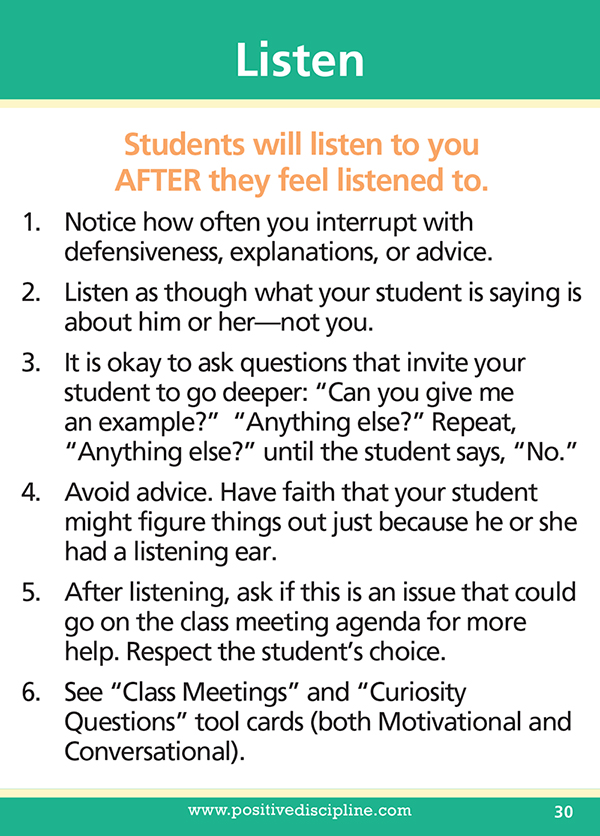by Dr. Jane Nelsen and Dr. Kelly Gfroerer
We have heard students say that it doesn’t do any good to talk because adults don’t listen—they just lecture. Could this be true? And if so, why? We will make some guesses.
Most adults think it is their job to teach, and that the best way to teach is to lecture. Too often we don’t notice that we are creating resistance instead of appreciation. Or, many of us don’t listen because we are too busy defending or explaining our point of view.
One of the best ways to teach good listening skills is by modeling good listening. Here are some Listen Tool Tips which may help. Remember your students will listen to you AFTER they feel listened to.
One of the best ways to learn and practice good listening with your class is regular Positive Discipline Class Meetings. Listening and effective communication are essential skills of a Positive Discipline Classroom. For example, when students sit in a circle and practice taking turns talking and listening as they share compliments, they also will listen as they share possible solutions because they know they can choose the one that works best for them.
Teachers have shared the tremendous growth they see in their students’ ability to listen and wait (self-regulate) a result of class meetings. One teacher shared, “Positive Discipline Tools have changed the way I interact with my students. In the last two years, I have added class meetings to our daily schedule and the results have been astounding. Within a month, students were greeting each other with eye contact when saying “Good morning,” giving meaningful compliments to each other. This teacher shared that through the class meeting process, she herself became more aware of the importance of actively listening to her students. Her students were more engaged and involved.
One middle school student shared that she knows her teacher respects her because she listens to her opinions. “When I talk my teacher looks me in the eye. I know she cares what I have to say.”
A high school English teacher shared how much her students were influenced as a result of using this tool. When she practiced listening, she found her students were more engaged in class, participated in class discussions and shared more openly. She found her students were more comfortable asking questions especially about things that were difficult or they didn’t understand.
Researcher shows that students perceive teachers as more effective when teachers listen to what they have to say (in class as well as outside the classroom at places like recess or the lunch room) Listening helps build positive relationships and studies clearly identify that close teacher and student relationships have a positive effect on academic success as well as social and emotional learning.
Here is an excellent video illustration of the importance of listening.


No Comments yet!